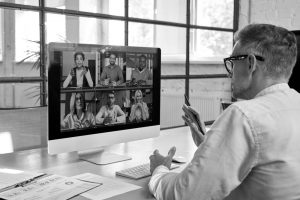Webinars in Classical Homeopathy
Introduction
Welcome to our webinars in classical homeopathy! These lectures offer a unique opportunity to deepen your knowledge and skills under the guidance of Rob Willemse, an experienced homeopath. Each session is meticulously designed to be both educational and enjoyable, ensuring you gain practical insights and a deeper understanding of classical homeopathy. Whether you’re a seasoned professional or just starting your homeopathic journey, these sessions are designed to be educational, accessible, and engaging.
Table of Contents
Goal and content of the lectures
Our online lectures are designed to be easily understandable, following the natural laws of healing. Each lecture focuses on discussing one case in detail, providing a thorough back-to-front analysis. These cases serve as a foundation for explaining various theories, materia medica, medical knowledge, repertory, and best practices. Each lecture also offers time for questions, ensuring that all participants can engage and clarify their understanding. The lectures are delivered in English and are easy to follow, making them accessible to a broad audience. These lectures are open to anyone interested in classical homeopathy, regardless of their experience or educational background. There is no need to prepare in advance; just join and be ready to learn and grow professionally.
These lectures are not part of a sequential course. Every lecture can be attended without the need to have attended a previous one. Obviously, it is a good idea to attend all lectures to get the most out of these lectures. However, when you unfortunately cannot attend one lecture, it is not a problem.
 Teacher
Teacher
Join our monthly lectures in classical homeopathy, led by Rob Willemse, an experienced homeopath with 20 years of expertise. Rob has been a dedicated teacher for many years and has managed a comprehensive course in classical homeopathy in the Netherlands for nearly 15 years, as well as several years in Sweden.
 Structure of the lectures in general
Structure of the lectures in general
In general, we have the same program during each lecture.
- Introduction: Welcome and introductory remarks.
- Primary case discussion: A case will be discussed with at least one follow-up. The most important aspects of the analysis and finding the similimum will be discussed.
- Supplemental discussion: Important information that is related to the main case is discussed. Examples are: case management, theory/Organon, repertory, history, medical topics, and so forth.
- Q&A: Free flow discussion of questions posed by the participants.
Structure of each specific lecture
Here is the information about the detailed topics that will be discussed during each session. Click on the + sign to expand the information. We will add several new webinars soon.
- Case: Profuse perspiration in a 74-year-old female
- Medical: Hyperhidrosis, Hypohidrosis, Anhidrosis, Nocturnal hyperhidrosis, Neuropathic perspiration
- Materia medica: Differential diagnosis of some remedies with perspiration,
- Theory: Perspiration in the repertory & materia medica
- Theory: Technique combination of remedies
- Case: Autism in a 5-year-old boy
- Materia medica: Differential diagnosis of several important remedies
- Medical: Some Autism Spectrum Disorder
- Theory: When to change remedies, Technique one-sided disease
- Case: Mitochondrial Myopathy in a 46-year-old woman
- Medical: Several Myopathy disorders
- Theory: Homeopathy and genetic diseases, Strategy keynotes
- Materia medica: Some differential diagnosis of relevant remedies
- Case: Calcium Pyrophosphate Deposition Disease (pseudogout) in an 84-year-old woman
- Medical: Several crystal and inflammatory joint diseases disorders
- Materia Medica: Differential diagnosis of several relevant remedies
- Theory: Strategy pathology, Biography of Adolph von Lippe
- Case: Autism in an 19-year-old woman
- Medical: Some autism related disorders
- Materia Medica: Differential diagnosis of several relevant remedies
- Theory: How to handle different types of patients / Technique combination of pathology
Why participate the online lectures?
 Here are some reasons why you should definitively join our lectures:
Here are some reasons why you should definitively join our lectures:
- Difficult topics are explained in an easy-to-understand way.
- Very practical, and the tips and tricks can be applied immediately.
- Our sessions are both informative and enjoyable.
- No extensive preparation is required.
- Enhance your knowledge and skills in classical homeopathy.
Don’t miss this opportunity to learn and deepen your understanding of classical homeopathy, enroll now.
Practical information
- Cost: €25 per lecture
- Refund Policy: Refunds are available up to two days before the lecture. See Q&A for more detailed information.
- Registration: We use Eventbrite to manage the payments for the lectures. Enroll by clicking on the event in at Schedule and follow the steps.
- Audience: Open to all practicing homeopaths and students. See the Q&A section for more information.
- Webcam: It is required to turn on the webcam during the lectures.
- Language: The lectures are in English and are easy to follow.
- Duration: The duration of a lecture is about of 1.5 hours. See the details of each lecture for more information.
- Accreditation Netherlands: CAT Collectief (2 SBU), FAGT (1,5 point), LVNT (0,25 day), NOKH (1,5 hour per session), NVKH (per 4 sessions 1 point), NWP (1 point), VBAG (0,5 point).
- Accreditation Sweden: KHY (not applicable/on request), Riskferbunter (on request)
See also the Q&A section for more information and details.
Schedule of online lectures in classical homeopathy
Use this link to go to the collection of lectures.
Questions & Answers
Yes, we kindly ask that you turn on your webcam during the sessions. This helps ensure the sessions remain personalized and private. By having your webcam on, we can better connect and interact, creating a more engaging and effective experience. If the webcam is not turned on, you will be removed from the meeting to maintain the quality and integrity of our sessions.
Although the Eventbrite conformation emails state that you have purchased or reserved a ticket, you do not have to actually hand over or show this ticket before a lecture. Shortly before the sessions start, you gain access to the Zoom link to attend the lecture. At the start of the lecture we will check if the attending people have paid for the session and this will be sufficient.
Our lectures are designed to be inclusive and beneficial for a wide range of participants, whether you are a seasoned practitioner or new to the field of homeopathy. However, to ensure that everyone can follow along and gain the most from the sessions, we do have a few recommendations:
- Experience in homeopathy: We recommend that attendees have some prior experience in practicing or studying homeopathy. This can include formal education, practical experience, or even self-study. This helps ensure that participants have a basic understanding of homeopathic principles and methodologies.
- Understanding of English: As the lectures will be conducted in English, a basic understanding of the language is helpful. This will allow you to fully engage with the material and participate in discussions.
- Open to learning: Anyone with a genuine interest in homeopathy is welcome. Our goal is to create a learning environment where everyone can grow their knowledge and skills, regardless of their current level of expertise.
- Perspective of classical homeopathy: It’s important to note that our lectures focus on classical homeopathy. While there are many approaches within the field, we adhere to the principles of classical homeopathy. This means that our teachings and discussions will be grounded in this perspective.
By attending our lectures, you will have the opportunity to deepen your understanding of classical homeopathy, engage with like-minded individuals, and enhance your practice. We believe that with some foundational knowledge and a willingness to learn, anyone can benefit from these sessions.
There is no preparation necessary. The case will be presented during the session and will be discussed with the participants.
You can, however, take advantage of the Q&A session at the end of the lecture and ask questions or discuss topics like theory, materia medica, cases management, Organon, and so forth. It is a good idea to write down your questions when they come to mind so you do not forget to ask them during the session.
Unfortunately, there will be no notes or hand-outs in these lectures.
We use Zoom to facilitate the video lectures. It is advisable to install the Zoom app, but this is not required (using just your web browser is possible). A good and stable internet connection is advised.
We cannot be held accountable for the internet connection and functioning of your electronic devices (laptop, tablet, phone).
It is obvious that we ask you to refrain from attending the lectures while participating in traffic.
When you have paid for the session, you will receive the link to the Zoom session 15 minutes before the lecture starts. It will be on the event page. A link to this page can be found in the confirmation email you received from Eventbrite.
This guide provides a comprehensive set of best practices for videoconferencing in general, covering technical preparations, etiquette, and useful resources. By following these tips, you can enhance your virtual presence, contribute more effectively, and make the most out of your online interactions.
- Technical preparation
- Test your equipment:
- Ensure your microphone, speakers, and webcam are working properly before the meeting. Conduct a test call with a friend or use the platform’s built-in testing tools.
- Have a backup plan (e.g., an extra pair of headphones or an alternative device) in case of technical issues.
- Consider closing unnecessary applications on to have an optimal functioning of the video stream.
- Stable internet connection:
- Use a wired connection if possible for more stability.
- If using Wi-Fi, ensure you are close to the router or access point to avoid connectivity issues.
- Lighting:
- Position yourself in a well-lit room. Natural light is ideal, but avoid having light sources directly behind you to prevent being silhouetted.
- Use additional lamps or ring lights to enhance visibility if necessary.
- Background:
- Choose a neutral background free of distractions. Many platforms offer virtual background options if your environment is cluttered, but often this is not a desirable option compared to actual distraction-free background.
- Perhaps you want to check if your background is professional and appropriate for the meeting context.
- Camera angle:
- Position your camera at eye level to create a natural and engaging eye contact.
- Avoid extreme angles, either too high or too low, to maintain a professional appearance.
- Test your equipment:
- Etiquette and engagement
- Punctuality:
- Join the meeting a few minutes early to settle in and address any last-minute technical issues.
- Respect the scheduled start and end times of the meeting.
- Dress appropriately:
- Dress as you would for an in-person meeting. This helps maintain a professional atmosphere and shows respect for other participants.
- Mute when not speaking:
- Keep your microphone muted when you are not speaking to avoid background noise.
- Unmute yourself when you need to speak and remember to mute again afterward.
- Active participation:
- Stay engaged by actively listening and contributing to the discussion.
- Use non-verbal cues, such as nodding, to show you are paying attention.
- Avoid multitasking during the meeting to give your full attention to the conversation.
- Use the chat function wisely:
- Use the chat function for relevant comments or questions without interrupting the speaker.
- Avoid side conversations that can distract from the main discussion.
- Be respectful:
- Wait for your turn to speak and avoid talking over others.
- Be mindful of cultural differences and respectful of diverse opinions.
- Punctuality:
- Good Resources
- For more detailed guidance, check out these useful resources:
You can apply for a refund and get your money back. The fastest and easiest way for a refund request is via the link in the confirmation e-mail you received when enrolling for the event. Keep in mind the following:
- Refunds are only possible until 1 day before the event is scheduled.
- The ticket fees are non-refundable unless you purchased the ticket less than 7 days ago or the event has been rescheduled.
See Eventbrite: Can I get a refund for more information.
We will use the information you provided to us, the ticketing service or newsletter service only to contact you in concerning the lectures. We use only the minimum information required to communicate about the lectures, to manage payments, and to send you information about other events and lectures we organize. At any point, you can unsubscribe (newsletter), cancel (ticketing service) or e-mail us that you would like to remove information from our systems.
We only use information that you have actively provided to us or the digital services we use to organize these lectures and classes.

